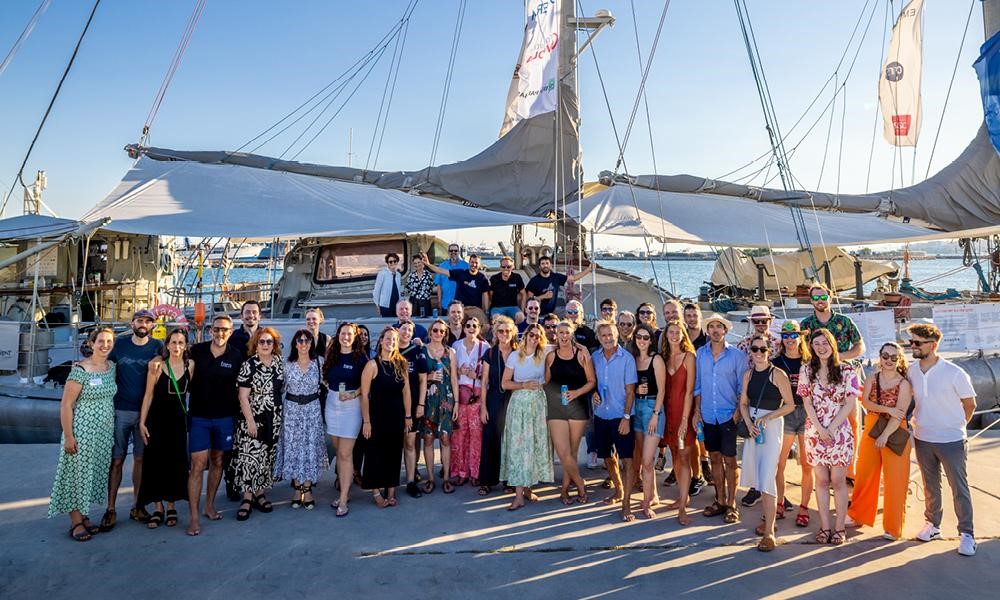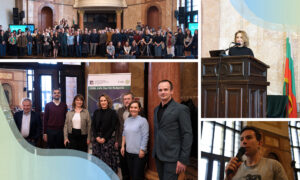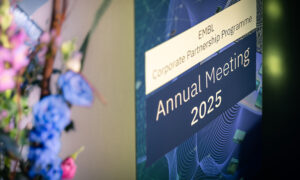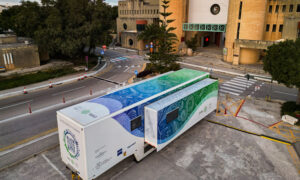
TREC expedition concludes sampling in Greece
The TREC expedition concluded its sampling phase in Greece and strengthened scientific exchange and collaborative networks with their Greek partners during a political and scientific stakeholder event in Athens.
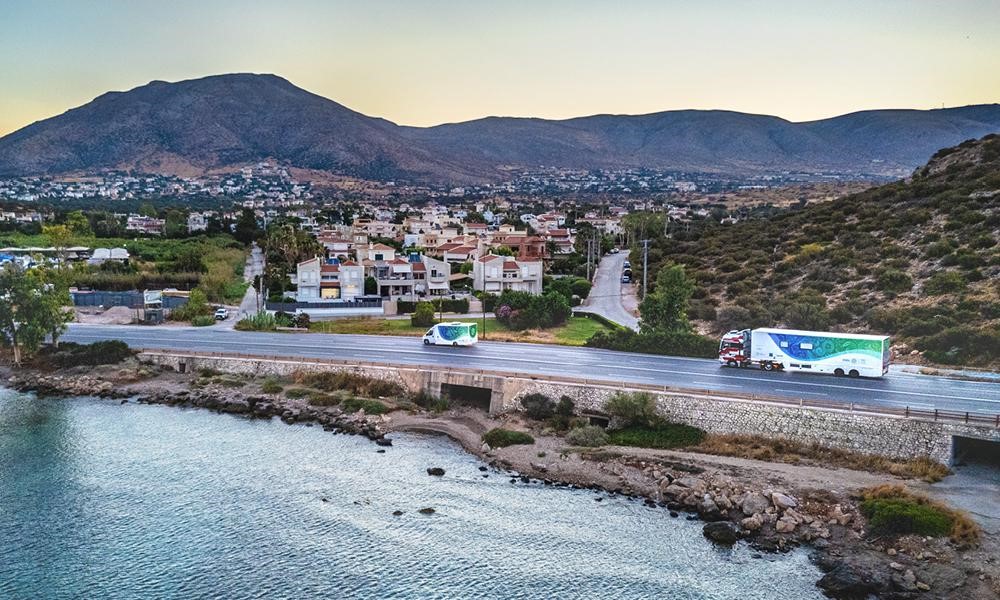
In a country known for its biodiversity – both on land and sea – the EMBL TREC expedition spent some of its final days on the road, collecting soil, air, water and sediment in the regions Attica and Thrace. Greece is a relatively small country with endless shores and countless islands, and hosts over 36 million tourists every year. Marine biological research is firmly established in the country, also thanks to government research organisations such as the Hellenic Centre for Marine Research (HCMR), which operates under the General Secretariat for Research and Technology of the Ministry of Development. And recently, HCMR and EMBL have collaborated on metagenomic profiling of marine microbial communities. Located in the Attica region, HCMR made sense as TREC’s first port of call in Greece.
So, from early to mid-July, TREC sampled all over Attica. HCRM also hosted EMBL’s Advanced Mobile Laboratory for a month, enabling collaborative use of the equipment by local and international scientists. Additionally, the land and sea sampling teams from EMBL and the Tara Ocean Foundation continued beyond Attica for two weeks along the Greek coast.
Collaborative research to protect local ecosystems and biodiversity
Before pitching tents in Attica, expedition partners invited Greek ministerial representatives, scientists, and local and national institutions to a scientific exchange and celebration titled, Science and cooperation to tackle global challenges: towards a more sustainable life on our planet.
More than 90 guests attended the event, chaired by Antonios Magoulas, Director and President of the HCMR Board of Directors, and Louisa Giannoudi, Research Associate, HCMR.
Greek Development Minister Takis Theodorikakos officially welcomed the expedition to Athens on behalf of Prime Minister Kyriakos Mitsotakis. Other Greek government representatives at the event were: Zoe Rapti, Deputy Minister of Development; Athanasios Kyriazis, Secretary General for Science and Innovation; Petros Varelidis, Secretary General for Natural Environment and Water; Myron Flouris, Secretary General for Tourism Policy and Development; Dionysia-Theodora Avgerinopoulou, the Greek Prime Minister’s Special Envoy for the Ocean; and Laurence Auer, French Ambassador to Greece.
Edith Heard, EMBL Director General, Romain Troublé, TARA Ocean Foundation Executive Director, and Marco Borra, Italy’s Scientific Attaché in France, on behalf of EMBRC-ERIC, addressed the guests.
“Greece has always been an enthusiastic proponent of European science and collaborative research,” Heard said. “EMBL and TREC have engaged the European scientific community like never before. The network created during this expedition will be the basis for groundbreaking discoveries.”
Peer Bork, EMBL Heidelberg Director and TREC Scientific Director, and Paola Bertucci, Head of EMBL Scientific Expeditions, recognised the TREC team’s achievements in ensuring TREC’s scientific, societal, and collaborative impacts. Additionally, Heard, Troublé, Bork, and Bertucci presented medals of merit to the teams from TREC and the Tara Ocean Foundation.
The event included tours of EMBL’s mobile laboratories and the schooner Tara as well as a reception for dignitaries and scientists to interact.
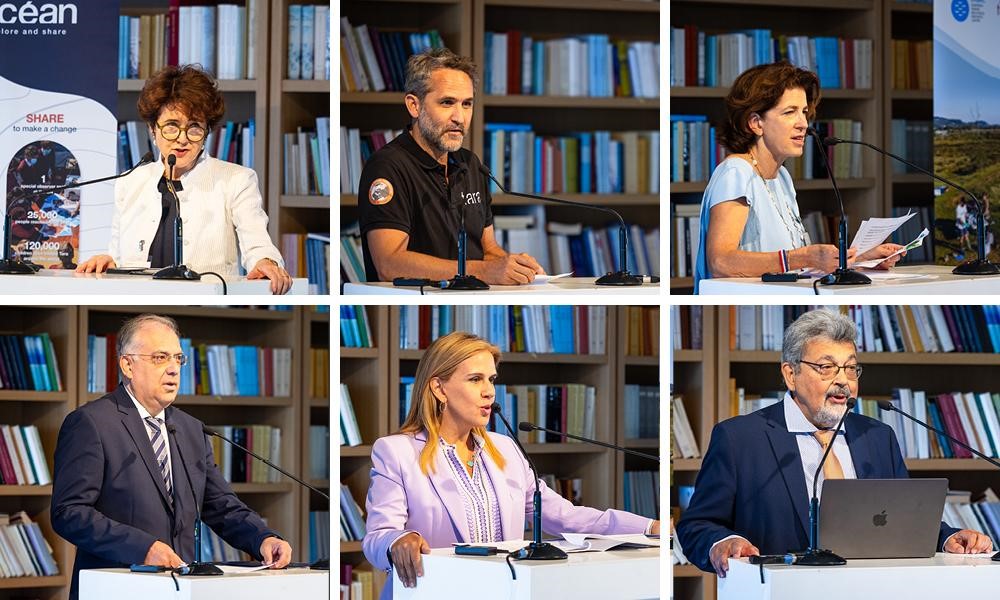
Scientific talks began with EMBL’s TREC scientists and Colomban de Vargas, Senior Scientist at the French National Centre for Scientific Research (CNRS).
Constantinos Mylonas, Director of the Institute of Marine Biology, Biotechnology and Aquaculture (IMBBC), and Soultana Zervoudaki, an HCMR researcher, chaired a second session. They presented successful ongoing marine biology research projects from the three research institutes that comprise HCMR: IMBBC, the Institute of Marine Biological Resources and Inland Waters, and the Institute of Oceanography.
While speakers stressed the importance of national efforts to understand and protect local ecosystems and biodiversity, they also highlighted the scientific need of joint international and interdisciplinary efforts. Creating awareness of local ecosystem pressures requires international collaborative research as ‘ecosystems don’t observe borders’, and for the collection of standardised, internationally comparable data. Europe’s ecosystems, and the planet more generally, depend on marine communities, such as the vital oxygen-producing plankton and algae.
The scientific exchange made possible through TREC served as a nexus for research partners in at least 21 countries and is an example of collaborative success. For innovative planetary biology research, we require this level of network building to understand the impact of pollution on local ecosystems along Europe’s coasts.
“The experience of the TREC mission, with its pan-European dimension and huge potential in terms of the volume of data collected, proves that it is only through the cooperation of governments, businesses, and civil society that we can ensure the conservation of biodiversity and the sustainability of wider ecosystems,” Deputy Minister Rapti said.
Expanding our knowledge of micro- and macroscopic communities
For the remainder of July, the TREC teams continued to sample the land-sea interface in the Thrace region of eastern Greece. Hosted by Aristotle University of Thessaloniki (KEDEC) and Democritus University of Thrace in Xanthi, the expedition sampled areas nearby, including Axios National Park, Imeros Beach, and Vistonis Lagoon.
The Greek bioscience community embraced the expedition’s aim to observe, model, and understand the changing coastal habitats. Specifically, human-caused environmental issues and diminishing biodiversity were central in the TREC collaboration in Greece.
Understanding these impacts on natural habitats means expanding our knowledge of micro- and macroscopic communities and may lead to solutions to some of society’s greatest challenges, such as the irreversible loss of biodiversity.
“Our seas and coasts are home to an extraordinarily rich diversity of life and play a crucial role in the stability and sustainability of wider ecosystems,” said Georgios Sylaios from the Department of Environmental Engineering, Democritus University of Thrace. “The goal of this great mission and collective effort is to determine how much human impact is affecting the environment.”
